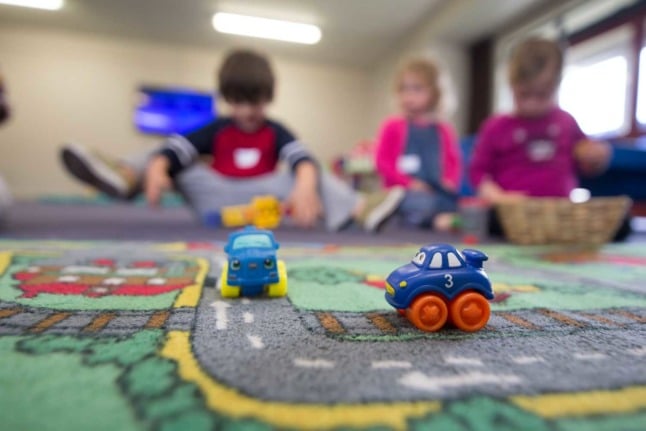The high costs of childcare are a frequent complaint of many a parent in Switzerland.
While this of course varies dramatically from canton to canton, the average cost of a day of childcare in Switzerland is CHF130.
The average Swiss family spends a massive 41 percent of their net income on childcare, three times the OECD average of 13 percent.
READ MORE: What is emergency childcare in Switzerland and how do I access it?
When paired with the cost of having children in Switzerland, it’s enough to make someone decide against having kids – or maybe leaving Switzerland altogether.
Tax
Keep in mind with all of these tips that you are able to deduct childcare costs from your tax in Switzerland.
This includes most forms of childcare, including for instance the costs of a private nanny.
In order to do so, you need to provide proof of payment when lodging your tax return.
Parents can deduct a maximum of 10,100 francs per child per year (federal tax), according to Swiss finance comparison site Comparis.
More information about how to deduct childcare costs from your tax can be found at the following link.
EXPLAINED: What can I deduct from my tax bill in Switzerland?

Second hand
One of the silver linings to Switzerland’s wealth is that it has a lot of wealthy people, who seem not to mind how much things cost.
As a consequence, there are often great deals on second-hand stuff for kids.
If you send your kid to a creche, they may ask you to provide a range of different things like clothes, umbrellas and other weather equipment and small nap mats or even a basic crib.
VERDICT: How to save money when raising children in Switzerland
Obviously this stuff is expensive, particularly if you’ve already bought it for home.
Remember in this case that eBay is your friend, while you can also check notice boards at the childcare facility itself to see if other parents have stuff to give away.
One inside tip is to change the postcode in your eBay search to a wealthier one, thereby improving your chances of finding a bargain.
Subsidies
When you learn that parents in Switzerland often spend 130 francs a day per child for childcare, you might feel like it’s time for a career change.
But due to the aforementioned tax breaks and subsidies paid out in the cantons, many parents will pay between 30 and 80 percent of this cost.
In Zurich for instance, if you earn 80,000 per year, you will be liable for around 70 francs per day.
Here is the calculator for Zurich which will tell you how much your subsidy will be on the basis of your income.

Take time off
Of course, less childcare is always going to be cheaper – so if you can work out a solution where you or your partner takes care of the kids for some of the time, then you’ll already be saving (other than of course the lost wages).
After birth, Switzerland has a moderate parental leave scheme, but the conditions offered by private companies are often better.
Keep in mind that your child will be able to attend pre-school or kindergarten from around four years of age. While pre-school is not compulsory, around 99 percent of Swiss kids attend it.
In Switzerland, children can start attending school from around six years of age, with cantons required to offer at least one year of pre-school education.
This does of course depend on the canton, with some offering two years and Ticino offering three.
If you can take advantage of flexible work, then you might be able to take a couple of years off to take care of the kids and go back to work when your kid hits pre-school age.
READ MORE: How to save money on childcare in Switzerland
You can also bite the bullet and call up the grandparents, if of course they live in Switzerland. You’ll have the kids back punctually and with a Swiss dialect in no time.
But if that’s not an option, then you need to consider the different types of childcare.
While most of us would think of a nursery or a creche as the standard, there are in fact several forms of childcare which are common in Switzerland.
This of course includes nurseries, but also extends to childminders (Tagesmütter or mamans de jour), babysitters, au pairs and private nannies.
More information as to the types of childcare available in Zurich can be found at the following link.



 Please whitelist us to continue reading.
Please whitelist us to continue reading.
Member comments